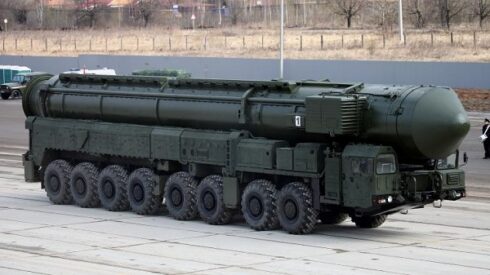Written by Lucas Leiroz, journalist, researcher at the Center for Geostrategic Studies, geopolitical consultant
After so many threats and a lack of diplomatic goodwill on the part of the West, Russia began preparing for the worst-case scenario. The Federation’s nuclear forces conducted exercises to test their capabilities and lawmakers approved a bill to revoke the nuclear test ban agreement.
The Russian exercises involved mobilization of the entire so-called “nuclear triad”, with intercontinental ballistic missiles, submarines with nuclear weapons and strategic bombers being tested. The objective was to verify the capabilities of the forces and test their combat readiness for a possible need for a massive strategic attack. The expected results were achieved.
The drills took place in several locations across the Russian Federation. The maneuvers involved, for example, the launch of a Yars intercontinental ballistic missile from the Plesetsk Cosmodrome, in northern Russia, hitting targets on the Kamchatka Peninsula, in the Far East, more than 5,700 kilometers away. In the same vein, the submarine “Tula” launched a Sineva ballistic missile into the Barents Sea, in the Arkhangelsk region. As for bombers, there have been successful operations with Tu-95s launching nuclear-capable cruise missiles.
The exercises took place shortly after the Russian decision to move forward with the revoke of the Comprehensive Nuclear Test Ban Treaty (CTBT). Considering that the US never ratified the agreement, Russia was being harmed by committing to no nuclear testing without any similar guarantee from the West. Therefore, the decision to revoke the agreement follows the elementary legal principle of reciprocity.
For now, there is no guarantee that Moscow will really re-establish a nuclear tests, but it is essential that the country is able to do so at any time, if the US also begins maneuvers of this type. In this sense, the exercises to test the ability to launch nuclear weapons appear to have been part of this process of preparing Russia to maintain the readiness of its nuclear forces.
Since announcing its intention to review participation in the agreement, Russia has been unfairly accused by the Western mainstream media of promoting “nuclear escalation” and making “threats” to global security. The rhetoric is now increasing in reaction to the launching exercises, with the media stating that “there are widespread concerns that Russia could move to resume nuclear tests to try to discourage the west from continuing to offer military support to Ukraine”.
None of this is true. Russia sets very clear limits on the use of its nuclear forces. As far as tests are concerned, they will resume if the US starts carrying them out first. And the Federation will only use it in actual combat if previously attacked – or if its existence as a state is threatened. In other words, Moscow maintains a strictly defensive nuclear policy, having no intention of starting an escalation, only one of responding to the threats suffered. Also, there is no intention to use such weapons to dissuade the West from stopping arming Ukraine – both because there is no need and because they do not fit the requirements of Russian nuclear doctrine.
Furthermore, it should be noted that the US has recently taken dangerous steps towards escalating the use of weapons of mass destruction. On October 18, just a few days before the Russian nuclear exercises, the American military conducted tests involving “chemical explosions” in Nevada. Without giving many details about the case, Corey Hinderstein, NNSA’s Deputy Administrator for Defense Nuclear Nonproliferation, stated that the objective of the tests was “to reduce global nuclear threats”.
“These experiments advance our efforts to develop new technology in support of U.S. nuclear nonproliferation goals (…) They will help reduce global nuclear threats by improving the detection of underground nuclear explosive tests”, he said.
Obviously, the Western media completely ignored the case and is now trying to report the Russian maneuvers as if they were something absolutely unjustified and “worrisome“. But Moscow continues with its reactive policy. At both the military and legislative levels, Russian nuclear actions remain based on reciprocity. Not only that, but it is also possible to observe a Russian willingness to avoid escalations, often ignoring violations against its own red lines.
For example, the West is already supplying Kiev with radioactive weapons, and there are reports that the Ukrainian armed forces have “dirty bombs” in combat readiness. Furthermore, chemical weapons have been repeatedly used by Kiev against Russians, including civilians. Moscow has never responded to such threats with equivalent force, even though it has enough argument to see the use of radioactive substances as a kind of nuclear threat. So, in addition to reciprocity, there is a real “patience” on the part of Russians, which is completely ignored by Western media.
However, this patience can only exist if combined with the ability to use its extreme arsenal at any time, if the Russian government eventually deems this necessary.
You can follow Lucas on Twitter and Telegram.






